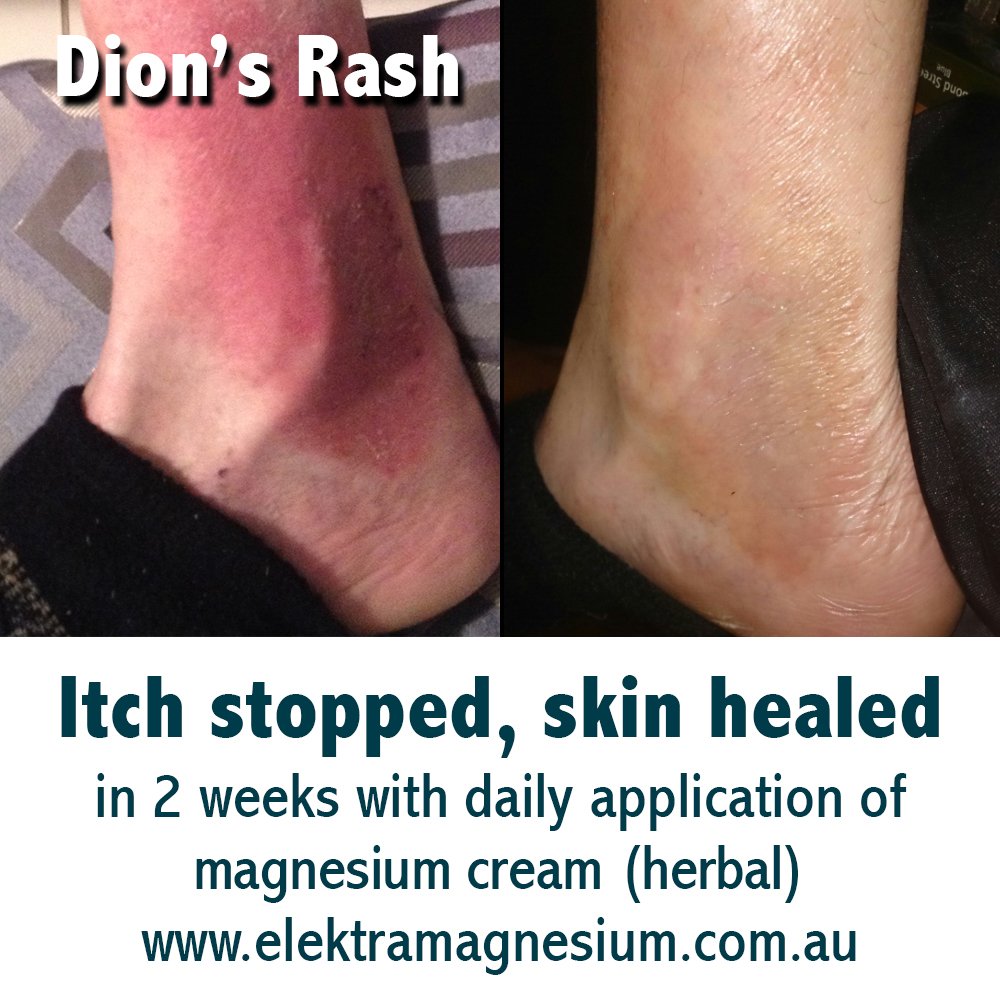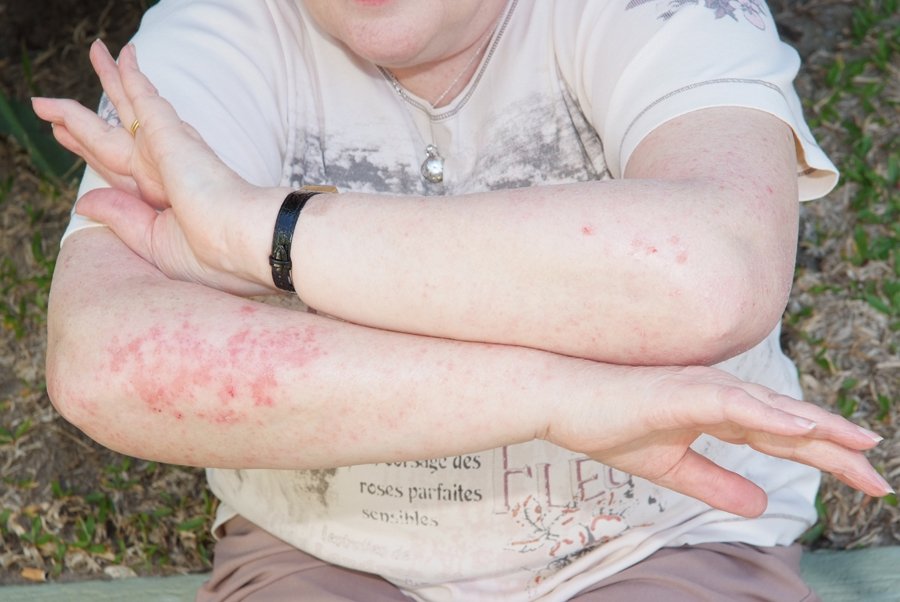Irritating skin conditions like eczema, psoriasis and dermatitis can become very debilitating for some people, with inflamed itchy skin tormenting them year after year. If you are in this category and have been shunted from pillar to post trying a multitude of creams, ointments and pills without success, then you may be very interested in some nutritional solutions that work.
The health of the skin is a window to what is happening on the inside of the body, and is just as dependent on gut health, as it is on the care of skin. Optimal results occur when you can work both ends towards the middle.
Detergents, alcohols and chemicals disturb skin barrier protection

The problem with many toiletries and personal care products is the veracity of their detergents and chemical ingredients. People can get terribly overloaded with repeated use – as many nurses and surgeons that are always scrubbing their hands can testify! They can strip out the protective oils in the skin barrier, thereby exposing it to the outside environment and potential microbial infection. To make matters worse, the chemical detergents and alcohols can then have access to the interior of the body.
If the skin oils are depleted we can lose too much moisture and the microbiome of the skin becomes disturbed, with the skin feeling exposed, extra dry and itchy. The skin feels itchy when the fatty insulation of the barrier is reduced and nerves are more exposed. If pathogens enter the gaps of the compromised epidermis, the immune system can be triggered, resulting in raised inflamed rashes or welts.
Poor gut health and acidosis leads to skin disorders
Apart from detergents, alcohols and chemicals on the skin, excreted waste toxins produced by internal cellular metabolism can also cause barrier disruption due to acidosis. This commonly happens if you have a metabolic disorder whereby the clearance of wastes is often on the sluggish side. This can overload the liver, pushing more wastes into the lymph system, which excretes via skin, causing irritation and inflammation. If this metabolism, detoxification, and pH balancing system doesn’t stabilise itself, it can also lead to an auto-immune problem.
Acidosis from gut disorders, detox and waste management problems affects the whole body. We need to keep our internal plasma and tissue cells in the alkaline range (about 7.35-7.45 pH) for optimal electrical and metabolic activity, detoxification, nerve signalling, cardiovascular function and overall health. This then also supports the pH environment of the skin, which happens to be slightly acidic (ie. a bit under 5pH).
The loss of collagen in the body due to excessive metabolic acids and free radicals causes thinning and weakening of the whole integumentary system. This means that skin, hair, nails, bones and teeth can deteriorate, and skin can feel more sensitive and exposed. The thinner the skin collagen the less of a reservoir to hold oils for skin barrier protection. As lipids (oils) are insulating and protective of nerve endings, the nerves of the dermis underneath the epidermis can become hyper sensitive to stimuli if the skin barrier thins too much.
Those who can’t detox readily can accumulate excessive metabolic acid wastes, such as people with hypothyroidism, diabetes, renal disorders or polycystic ovary syndrome. This means they have a bigger challenge to keep pH stabilised. An acidic gut will attract more pathogens and make the environment for beneficial bacteria much more hostile.
A natural diet of mainly alkalising foods also helps to counteract acidity. Choose organic high quality fresh food wherever possible, as opposed to overly processed packaged foods with chemical additives. Sugar and processed carbohydrates produce more acidic metabolic wastes, and so should be avoided to prevent cell acidity. Those who are sensitive to sugars do well on a ketogenic or paleolithic diet.
Alkaline foods, structured water, and sodium bicarbonate are a great help to buffer the excess acids. If you have trouble digesting food due to lack of stomach acid and enzymes, SIBO and GERD may result, producing waste fermentation acids further along the digestive tract. Natural digestive aids such as betaine hydrochloride can help with stomach digestion, preventing the sluggish passage of food through the digestive system with the associated bloating.
Faecal waste passage can also slow down in the larger intestine, contributing to constipation, diverticulitis, IBS (Irritable Bowel Syndrome) or Crohn’s disease. Any of these conditions can produce skin disorders, as the skin is another organ of waste excretion.
The epidermal microbiome deteriorates as a result of and after the internal gut microbiome becomes disrupted, which is why our digestive system function is so crucial in the healing of skin disorders.
Stress triggers inflammation and skin disorders

Sufferers of skin disorders notice that inflammation and itchy rashes seem to flare up commonly after excessive stress or sleep deprivation.
This means that the lower the magnesium the less we can cope with stress and the more hypersensitive we get. In a stressed state the energy is diverted to muscles and away from digestion, and thus contributes to sluggish metabolism and building up of acidic wastes which cause free radical damage.
Adrenalin also causes dehydration and increases acidity, thereby further exacerbating skin disorders and feelings of restlessness. However, magnesium and water have an alkalising effect, rehydrating cells and dampening down the adrenalin. This alleviates stress, supports metabolism, is anti-inflammatory, and helps to restore pH balance.
Calming down stressed skin and stopping the irritating itch


Calming down stressed skin is relatively easy if you feed it what it needs to recover. To protect the nerves you need enough lipids from quality plant oils and butters. They not only act as nerve and sensitivity insulators, but also help to hold in moisture. When magnesium is part of that oil and water combination the skin matrix can recover because it then has better electrical conductance and support for mitochondrial metabolism to repair and regenerate collagen structures.
Magnesium is also essential in the synthesis of collagen and elastin proteins which are needed for skin structure and elasticity. When you massage skin and muscles with Magnesium Cream, Lotion or Oil you also stimulate more capillary blood flow to deliver nutrients to the skin.
As everyone is different, Elektra Magnesium offer a range of magnesium products with different strengths of magnesium and varying blends of plant oils and butters. The four standard Magnesium Creams all have the same magnesium concentration where one teaspoon delivers 150mg magnesium, however the most popular one with customers that have itchy, dry or flaky skin conditions is Herbal Magnesium Cream.

Elektra Magnesium has recently released a product to cater for ultra-sensitive skin types (including young babies) called Baby Calm Balm, which delivers 50mg of magnesium per teaspoon. It also features very skin calming and rejuvenating oils like rosehip, calendula and chamomile.

Remember not to use magnesium directly on broken skin because it is a salt and can sting unless the skin is closed. However, you can work around an area that has abrasions. The magnesium will still be absorbed to do its good work on the inside. If you accidentally apply some on a wound just rinse it off with water. If you also have acne then you may find Charcoal-Pomegranate Cleanser a great help because it’s not abrasive and very gently cleanses and detoxes skin, whilst inhibiting acne bacteria. A little bit goes a long way with this cleanser, and it supports the skin leaving a smooth hydrated finish.
For those with very acute skin conditions it is recommended to bathe in warm water with magnesium chloride (one cup of flakes per standard bath). If you use Epson salt (magnesium sulphate) instead, it may cause dry itchy skin as the sulphate component removes too many protective oils. The Epson salts also have less magnesium content (9%), whereas Elektra Magnesium chloride flakes contain 15-16% magnesium and are gentler and more hydrating for skin.

Magnesium bathing helps the body to detox transdermally, which lifts the load on the liver detox system. Try a little (very gentle) Baby Calm Balm after the bath to reseal and protect the skin barrier. If your skin is not in the ultra-sensitive category, you can go straight to Herbal Magnesium Cream for rich skin moisturisation and potent delivery of magnesium.
By Sandy Sanderson © 2023 www.elektramagnesium.com.au


